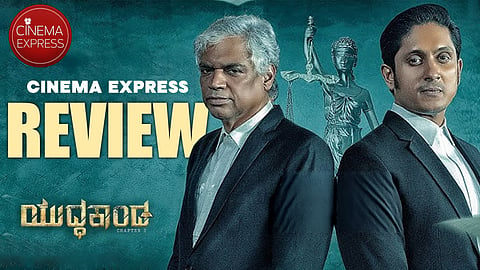Yuddhakaanda Chapter 2 Movie Review: Shines a light on justice lost
Yuddhakaanda Chapter 2 (3 / 5)
Yuddhakaanda Chapter 2 portrays the courtroom not merely as a place for legal debate but as a war zone where truth bleeds, justice limps, and silence screams loudest. The film opens with a moment so tense, it pulls the breath out of the room. A young woman steps into the courtroom premises and fires a bullet. But this isn’t a stunt for shock value. It’s a culmination—a whisper turned into a roar after being ignored by the system one too many times. What follows isn’t a murder mystery but a slow, simmering dissection of what we call justice.
Director: Pavan Bhat
Cast: Krishna Ajai Rao, Prakash Belawadi, Archana Jois, Supritha Sathyanarayana, and Radnya Rakesh
We are shown the echoing halls of Dharma College of Law—the place where justice is first learnt and often unlearnt. Here, Robert D’Souza (Prakash Belawadi), a seasoned legal mind, delivers a rousing oath to future lawyers, including Bharath Hanumanth (Krishna Ajai Rao), a hotel cashier due to circumstances but a lawyer driven by grit. Bharath isn’t your polished legal hero. An orphan who’s survived on instincts, he’s raw, driven, and learning as he goes. After bouncing through firms, he lands in the neglected chamber of Nagabhushan Associates with just a 40 per cent cut of whatever he wins as his pay. But in that creaky, dusty space, filled with case files, he finds his footing. Sapna (Supritha Sathyanarayana), a poised legal consultant, steadies his chaos with quiet strength and clear thinking.
His early cases—workplace harassment and a road accident—may seem minor, but to Bharath, they’re battlegrounds. His methods are scrappy, sometimes cheeky yet effective. Each courtroom session chisels him, building his confidence and craft. Then comes Case 19/1 - 2023.
Niveditha (Archana Jois) is charged under IPC 302 for a murder at the courtroom premises. The victim? Jackie, brother of an aspiring politician, Janardhan. But this isn’t just about a shooting. It’s about everything that led to it—a mother’s fight for her comatose daughter (Radnya Rakesh), a system that silenced too long, and a trail of trauma, drugs, and denial.
Across the bench stands Robert, the very man who once inspired Bharath. Now, the mentor and the mentee face off. Robert, with over 200 wins. Bharath, with six months of courtroom hustle. But this battle is not about numbers; it’s about conviction and rage.
The film’s first half is a riveting build-up, a blend of courtroom tension and human struggle, where justice isn’t just argued but lived. Director Pavan Bhat lets emotions brew instead of spoon-feeding them. The pacing is deliberate. Scenes breathe—sometimes slow, and sometimes painfully—but that’s the point. Justice delayed isn’t just denied here, it’s dissected.
The second half opens it all up. Just when you think it’s about one case, it reveals layers—lives that mirror Niveditha’s, minus the headlines. The courtroom becomes a lens through which we view neglected truths. However, the film's impact extends beyond legal arguments. It resides in the poignant silences—the image of a child on a ventilator, a mother's desperate pleas at the closed doors of justice. These moments act like mirror shards, reflecting the aspects of India we choose to see or ignore.
Krishna Ajai Rao doesn’t just play a lawyer—he becomes one. His sincerity carries the film. This isn’t merely a performance; it’s a belief made visible. Possibly his most moving work yet, both as actor and producer. Prakash Belawadi, razor-sharp as Robert, is as unsettling as he is calm. He makes being wrong look dignified—a masterclass in restraint and layered portrayal. His quiet forcefulness gives the film its spine. TS Nagabharana, as the judge, doesn’t need volume to command presence. His final words don’t feel written; they feel remembered, like we’ve heard them before in editorials or candlelit vigils. They echo with the weight of national conscience. Archana Jois is electric as Niveditha. She doesn’t ask for sympathy. She demands to be heard. Her pain is not told—it is unveiled, layer by layer, with haunting clarity. You don’t just understand her—you carry her story long after the film ends. With support from Radnya Rakesh and Supritha Sathyanarayana among others, the film occasionally teeters on melodrama—especially in emotionally intense courtroom scenes—but it regains balance quickly. Cinematography stays clinical, fluorescent-lit and unglamorous, capturing the court corridors realistically. The music knows when to vanish, letting silences take over.
In the final act, Bharath, the lawyers, and Krishna Ajai Rao, write to the President — not out of hope, but desperation. A raw plea not just for one client but for the nameless many stuck in dusty files and rusted systems It's a powerful moment, suggesting that perhaps only when stories like Yuddhakaanda are acknowledged can there be a sense of resolution. Cinema doesn’t always have to entertain. Sometimes, it must plead. Yes, it’s a legal drama. But it’s also a reminder that justice, when delayed, is reshaped into something unrecognisable. Something denied. Dismissed. And perhaps that’s what the makers intended.

